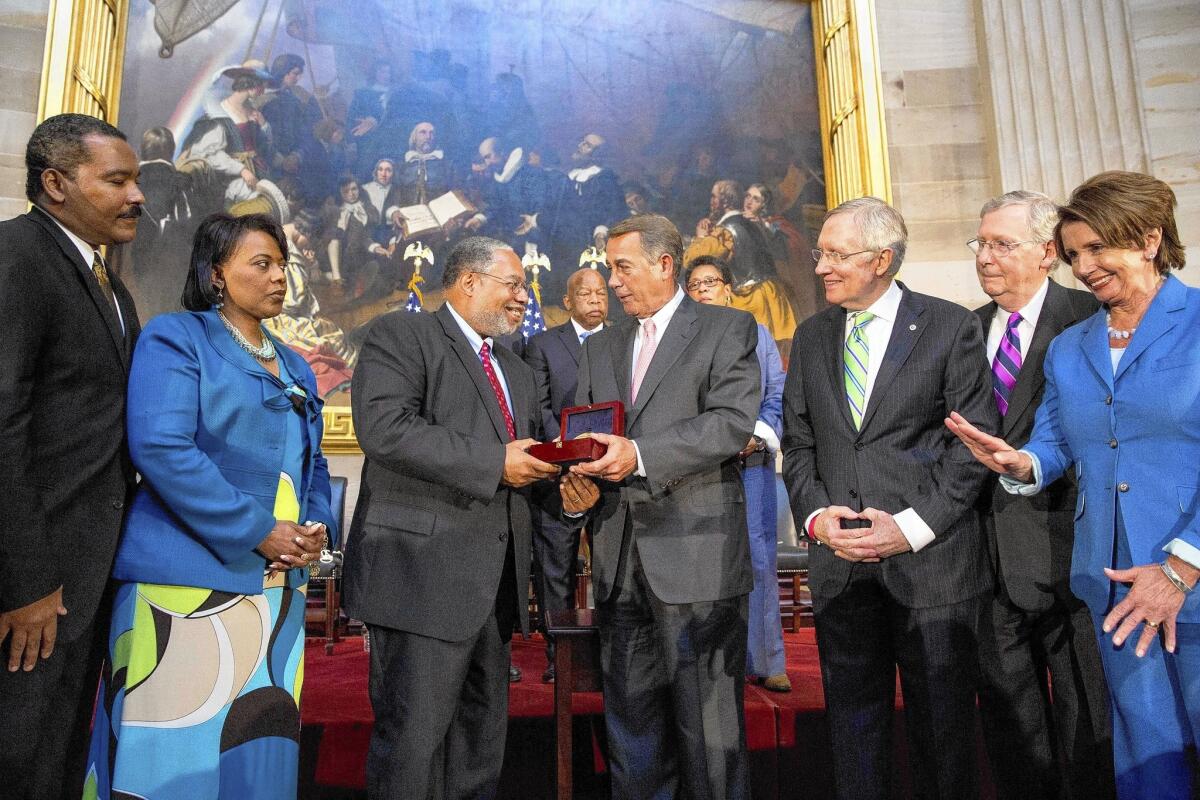The long path to the Congressional Gold Medal

- Share via
Pat Summitt may be on the way to receiving the Congressional Gold Medal, but Sally Ride has a way to go.
Many are recommended for Congress’ highest civilian honor, but only a handful receive it.
Still, it’s been awarded to a heart surgeon, a comedian, a pope, a queen and members of the 1980 Summer Olympics team who couldn’t compete for the other kind of gold because the U.S. boycotted the Moscow games.
President Obama recently signed legislation awarding the medal to the American Fighter Aces; members of the Doolittle Tokyo Raiders; the Monuments Men, whose story was depicted in the George Clooney film; and members of the 65th Infantry Regiment, known as the Borinqueneers, a Latino unit during World Wars I and II and the Korean War.
Congressional leaders last week posthumously awarded the medal to the Rev. Martin Luther King Jr. and Coretta Scott King at a Capitol Hill ceremony, on the 50th anniversary of the Civil Rights Act, and to Israeli President Shimon Peres. Next week, they will present the medal posthumously to Raoul Wallenberg, a Swedish diplomat who saved thousands of Jews from going to Nazi death camps.
Supporters must line up two-thirds of the 435-member House and 67 of the 100 senators as co-sponsors for a measure to be considered. The push to honor women’s basketball coach Pat Summitt has 113 sponsors in the House and two sponsors in the Senate; so far the movement for Sally Ride, the first American woman to travel into space, has 81 sponsors in the House, but no Senate bill.
Who gets a medal often depends on who gets behind the effort and how persistent they are in pushing for the recognition. Elizabeth Taylor’s appearance before a congressional committee on behalf of John Wayne in the late ‘70s helped the Duke get it.
The first recipients of the medal — established years before the Medal of Honor — were military heroes. George Washington received the first, but many other honorees are little remembered today.
Congressional gold medals have been awarded for long-forgotten events; Congress in 1941 authorized a medal for 11-year-old Roland Boucher for rescuing five playmates who had fallen through the ice of Lake Champlain while skating.
Lately, an effort has been underway to pay tribute to World War II veterans before it’s too late.
Legislation has been introduced to award gold medals to Filipino World War II veterans and members of the Office of Strategic Services.
Gold medals, generally three inches in diameter, are designed and struck by the U.S. Mint at a cost of about $30,000. The legislation usually provides for the production and sale of duplicate bronze medals.
Here is a look at some of the individuals and groups proposed for gold medals:
• Pat Summitt “in recognition of her remarkable career as an unparalleled figure in women’s team sports, and for her courage in speaking out openly and courageously about her battle with Alzheimer’s.”
“The Congressional Gold Medal is awarded to America’s most distinguished citizens, and there is perhaps no one in America who has made a more indelible mark on their profession and in their community than Pat Summitt,’’ Sen. Bob Corker (R-Tenn.) said of the longtime basketball coach from his state.
• Freedom Riders “in recognition of their unique contribution to civil rights, which inspired a revolutionary movement for equality in interstate travel.”
The Freedom Rides, which lasted from May to November 1961, included more than 400 black and white Americans who risked their lives to challenge Jim Crow laws — particularly in public transportation — in the South, said one of the bill’s chief sponsors, Rep. Hank Johnson (D-Ga.).
• Muhammad Ali. “It is long past time to recognize and honor an American civil rights activist and sporting legend with Congress’ highest honor,” said Rep. Andre Carson (D-Ind.).
• Lena Horne, in recognition of her contributions to American culture and the civil rights movement.
• Glen Doherty and Tyrone Woods, former Navy SEALs working as security contractors who were killed in the attack near a U.S. diplomatic compound in Benghazi, Libya.
“As the coordinated attack in Benghazi unfolded, Glen and Tyrone exposed themselves to enemy fire as they engaged attackers that were armed with guns, mortars and rocket propelled grenades,” said California Rep. Duncan Hunter (R-Alpine), the bill’s chief sponsor. “Their ultimate sacrifice saved the lives of numerous American personnel that were rescued and safely returned to their families.”
• Constance Baker Motley, the first black woman on the federal bench and a lawyer who helped steer many of the civil rights movement’s pivotal legal battles — including the landmark 1954 school desegregation case Brown vs. Board of Education and James Meredith’s fight to enroll at the University of Mississippi in 1962.
“As a lawyer, she fought tirelessly for the cause of civil rights, becoming the first African American woman to argue before the Supreme Court,” said Rep. Charles B. Rangel (D-N.Y.). “It was her efforts working with Thurgood Marshall and the NAACP Legal Defense Fund, where she was their first female attorney, which helped to end segregation in the landmark case Brown vs. Board of Education.”
• Sally Ride, the first American woman to travel into space.
“Despite being most famous for her time as a NASA astronaut, Dr. Ride was also a lifelong educator, public servant, research scientist, children’s book author, and advocate for women in science,” said Rep. Scott Peters (D-San Diego).
• Dr. R. Adams Cowley, in recognition of his lifelong commitment to the advancement of trauma care.
Rep. C.A. Dutch Ruppersberger (D-Md.) called Cowley the “father of trauma medicine,” a pioneer in emergency care who created the system that saved Ruppersberger’s life after a car crash in 1975.
More to Read
Sign up for Essential California
The most important California stories and recommendations in your inbox every morning.
You may occasionally receive promotional content from the Los Angeles Times.














